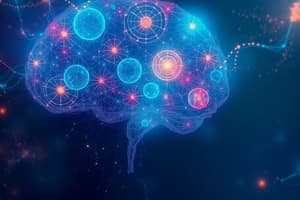Podcast
Questions and Answers
What is the upcoming feature in Microsoft Bing Chat known as?
What is the upcoming feature in Microsoft Bing Chat known as?
no-search
In what types of tasks is the no-search feature particularly useful?
In what types of tasks is the no-search feature particularly useful?
coding, math problems, casual conversation
Define memory in the context of cognitive processes.
Define memory in the context of cognitive processes.
the process by which information is encoded, stored, and retrieved
What are cognitive processes?
What are cognitive processes?
How are modern technologies like AI chatbots challenging our understanding?
How are modern technologies like AI chatbots challenging our understanding?
What role do memory and cognitive processes play in our ability to learn and develop?
What role do memory and cognitive processes play in our ability to learn and develop?
How do AI systems demonstrate capabilities similar to human cognitive processes?
How do AI systems demonstrate capabilities similar to human cognitive processes?
What role do search engines play in cognitive processes?
What role do search engines play in cognitive processes?
What impact has the ease of finding information online had on learning styles?
What impact has the ease of finding information online had on learning styles?
How might features like Bing Chat's no-search challenge traditional notions of acquiring and applying information?
How might features like Bing Chat's no-search challenge traditional notions of acquiring and applying information?
In what ways could advances in AI shape the future of learning environments?
In what ways could advances in AI shape the future of learning environments?
Why is it important to understand the relationship between memory, cognitive processes, and search engines in the context of technological advancements?
Why is it important to understand the relationship between memory, cognitive processes, and search engines in the context of technological advancements?
Flashcards are hidden until you start studying
Study Notes
Exploring Memory and Cognitive Processes: The Role of Search and No-Search
Modern technologies, like artificial intelligence (AI) chatbots, are pushing the boundaries of how we acquire and apply information—a core aspect of memory and cognitive processes. As AI systems become more sophisticated, they're challenging our understanding of how we learn, solve problems, and interact with technology.
One recent example of this evolution is the upcoming feature in Microsoft Bing Chat, known as "no-search." This feature will allow users to request that Bing Chat not search the web for answers to their questions, instead relying solely on its internal processing capabilities.
The Value of No-Search
The no-search feature is particularly useful for tasks that don't benefit from web searches, such as coding, math problems, or situations where users simply seek casual conversation. It underscores the importance of AI's ability to create self-contained, intelligent systems that can provide quick and accurate responses.
Memory and Cognitive Processes
Memory is the process by which information is encoded, stored, and retrieved. Cognitive processes are those mental functions that enable us to think, learn, and solve problems. Together, memory and cognitive processes play a vital role in our ability to learn and develop, as well as in our interactions with our environment.
AI systems, such as deep learning algorithms or neural networks, have shown capabilities that are reminiscent of human cognitive processes, as they can learn from data, make deductions, and recall relevant information autonomously.
Cognitive Processes and Search Engines
Cognitive processes are often supported by search engines, which provide users with relevant information from a wealth of available content. In this way, search engines serve as an extension of our cognitive abilities. However, the role of search engines in our cognitive processes is not limited to providing information. They can also change the way we learn, think, and solve problems.
For example, the ease with which we can find information online has led to the phenomenon of "curiosity-driven learning," in which we analyze information to satisfy our immediate curiosity, rather than to build a deep understanding of a topic. This shift in learning style can impact our ability to retain information, solve complex problems, and think critically.
The Future of Memory and Cognitive Processes
As AI systems continue to evolve, the relationship between memory, cognitive processes, and search engines will be shaped by new technologies. Features like Bing Chat's no-search will challenge our notions of how we acquire and apply information, and may prompt us to reconsider the role of web searches in our cognitive processes.
In the future, advances in AI may allow us to create adaptive learning environments that are tailored to our individual needs and cognitive styles. These environments could help us to learn more effectively, improve our problem-solving abilities, and develop critical thinking skills.
Conclusion
Understanding the relationship between memory, cognitive processes, and search engines is essential for navigating the rapidly evolving technological landscape. Features like Bing Chat's no-search are just one example of how AI is reshaping our cognitive processes, and it's an exciting time to be exploring the ways in which technology interacts with our minds. By continuing to explore the dynamics of memory and cognitive processes, we can better understand how AI can enhance our abilities and improve our interactions with technology.
Studying That Suits You
Use AI to generate personalized quizzes and flashcards to suit your learning preferences.




